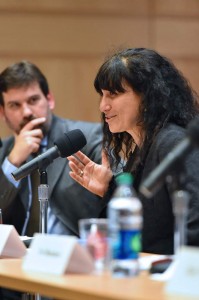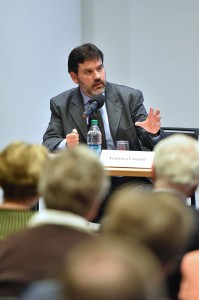
When you ask someone a question, are you really looking for an answer? Or are you actually trying to make a point under the guise of the inquiry?
If Catholics and Jews are ever going to engage in meaningful dialogue with one other, they need to consider this possibility, the authors of a new book told an audience at Fordham Law on Thursday, March 26.
Silvina Chemen, rabbi at the Congregation Beth El in Buenos Aires, and Francisco Canzani, PhD, head of the Department of Ecumenism at the Republic of Uruguay Monsignor Mariano Soler, recently published an English-language translation of A Dialogue of Life: Towards the Encounter of Jews and Christians (New City Press, 2015).
Chemen, a Jew, and Canzani, a Catholic, spoke about the difficulty of trying to bridge the divides of their respective faiths, noting that they were so dedicated to the pursuit of unity that they wrote the book on the same computer. Although they feel that much of the dialogue between Jews and Catholics, which started with the 1965 Nostra Aetate declaration at Vatican II, has been productive, there is much more to be done.
In fact, Chemen said Pope Francis is a major fan of their work. When he was Archbishop of Buenos Aires, Chemen said, Jews always felt comfortable reaching out to him, and every year, they commemorated the Kristallnacht at the Buenos Aires Metropolitan Cathedral.
“We Jews entered the cathedral as if were our house, and he entered our house if it were his house,” she said.
Canzani highlighted the fact that the Pope made that outreach official in three sections of Evangelii Gaudium, and said that as a member of the Focolare movement, he considers it his job to work toward unity. The book is meant to provide a road map for average lay people to want to talk to people with different faiths.

Chemen explained that for her, Tzimtzum, the Kabalistic notion that the presence of God covers everything, is a good frame of reference for thinking about listening.
When you cover everything, its impossible to let a new reality to be born, because you are everything. Listening is the simple and yet complicated act of allowing to other to have some space,” she said.
“So you contract yourself. You make yourself a little bit empty, to let the other be part of you, because if you are in all the spiritual space, you don’t really truly let the other be a part of you.”
A classic trap that we all fall into is when we’re in the middle of a conversation with someone, and we find ourselves thinking more about what our response to them will be, instead of what they’re actually saying, she said. She and Canzani have struggled with this sort of thing through tough questions, such as ‘Is it possible that your God is not mine, because yours is three, and mine is one?’
Canzani said listening actually makes you capable of asking better questions.
“If you don’t listen, you don’t understand. If you don’t understand, you don’t know how to ask questions of the other. For us, it’s very important, because some problems in religious dialogue come from the wrong questions,” he said.
“Our questions are full of prejudices, preconceptions, and all the stuff that we have wrongly learned over our long lives.”
Respondent Tsvi Blanchard, scholar in residence at the event’s sponsor, Fordham Law’s Institute on Religion, Law & Lawyer’s Work, joked that A Dialogue of Life was written to counteract people like him.
“I think I’ve made every mistake that’s listed in the book,” he quipped.
A lot of Catholic-Jewish dialogue in the past was about hurt feelings, long standing wounds, and maneuvering for position, and was more of a “dialogue of documents,” he said.
“We want to be open, we want to make space, and we want to ask the right questions. We really need to attend, but it’s not easy to attend. This book does not ask you to put that down and pretend that you have drifted into sainthood,” Blanchard said.
“There is in this a conversation about human existence that all of us can share.”
